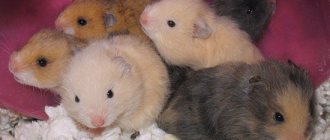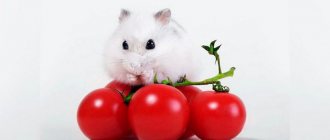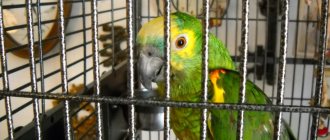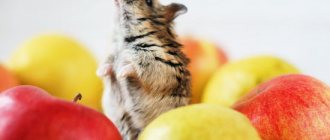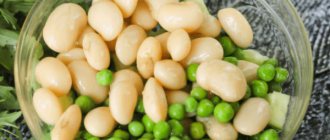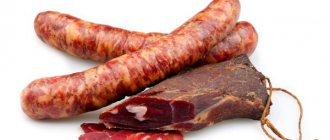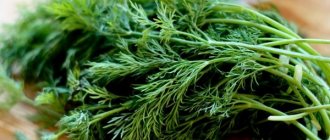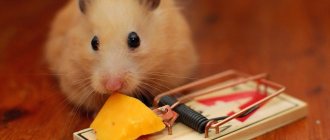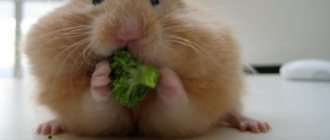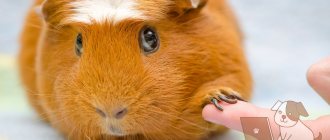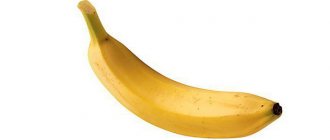Hamsters, as representatives of domestic pets, began to appear in people's homes relatively recently. Cute and funny animals quickly won the hearts of animal lovers for their unpretentiousness and playful nature.
In the process of breeding development, interest in these rodents increased so much that this led to the creation of clubs and societies for hamster lovers.
In addition to questions about breeding, animal owners are still arguing about the benefits and harms of certain foods in the diet. Among the controversial subjects of discussion, the question remains relevant: do hamsters eat bread?
Every owner of a furry pet tries to diversify their daily menu and pamper them with delicious food. But is it worth doing?
Is it possible to give a hamster bread and baked goods?
It is important to know that almost every type of bread contains yeast, which is very harmful to the rodent. Fermentation of yeast in the gastrointestinal tract can lead to:
- alcohol intoxication;
- nausea, vomiting;
- diarrhea with bloody discharge;
- rectal prolapse;
- flatulence;
- respiratory failure, suffocation;
- illness and even cardiac arrest;
- lack of attention;
- refusal of food;
- disorientation in space;
- lethal outcome.
IMPORTANT! Excessive consumption of bread by a hamster can lead to obesity and even diabetes.
Excess weight leads to diseases of the joints, bones, lungs and heart. Bakery products contain a lot of carbohydrates. And even more so, it is forbidden to give your hamster bread that has become moldy.
Should I give it black?
The composition of black bread does not contain such an increased content of pathogens for the stomach as in a wheat product.
However, fresh rye bread is also not an indicator for feeding a rodent. A high percentage of acidity can attack the intestines and be a serious irritant to the gastric mucosa.
The fermentation process that occurs in the digestive organs can last up to 4 hours, and due to the long intestines of a rodent, the breakdown into enzymes can be delayed, thereby causing obstruction.
Repeated consumption of a slice of black bread by a rodent can lead to stomach upset, ulcers, lethargy, or increased aggressiveness.
White
White bread, especially fresh bread, is harmful to hamsters. The flour from which this bread is baked contains a lot of starch. In addition, food bleach is added to white flour, which does not bring any benefit to the animal .
If you regularly feed your hamster white bread, there is a risk of developing pathologies:
- necrosis of renal tubules;
- malfunction of the adrenal glands;
- pancreatic diseases;
- malfunction of the thyroid gland.
Can hamsters eat meat?
There is a widespread belief among the owners of this animal that if you feed it meat, cannibalism will eventually manifest itself. In general, homas are herbivores. Nevertheless, they will gobble up meat products with joy.
Hamsters can have meat, but it must be fresh, lean and always boiled.
What will be harmful:
- pork;
- beef;
- fatty lamb.
Many owners of hamsters think that adding meat to their diet is not worth it, but the little pranksters need animal protein, which fills them with energy and helps them develop.
A little hamster just needs protein. Correctly calculating the diet is quite simple. You need to weigh your pet and give him food in the amount of 80 percent of his weight. Sometimes the diet can be 100 percent of the weight.
You should not give raw product to rodents; it may contain bacteria and parasites. It is pre-boiled in clean water. The ideal option is chicken, but pork and beef are best avoided. Fatty meat negatively affects the liver and causes obesity.
The food must be fresh, otherwise it will negatively affect the pet’s well-being.
Lard is fat, and it is difficult for both humans and hamsters to digest. It contains a lot of animal fat, which increases the amount of cholesterol and has no beneficial contribution.
You should not give dried meat, it contains a lot of spices and salt, which corrode the stomach from the inside.
Rye
This bread, in addition to rye flour, also contains wheat flour, and it is very harmful for hamsters. In addition, bread is highly acidic and is bad for your hamster's intestines, causing gas and constipation .
The salt present in rye bread can cause heart and kidney disease in rodents.
In addition to the above, rye bread causes:
- diarrhea;
- toxin poisoning due to constipation;
- lethargy, irritability, apathy.
What about black?
To answer this question, it is necessary, as in the case of white, to consider the composition of the product:
- rye flour;
- purified water;
- yeast.
Despite the belief that flour is beneficial for rodents, some people forget that it is a source of starch. Despite this myth, rye flour also only benefits humans, but not hamsters. Even despite the minimal starch content in such flour, it is still there. As mentioned above, a small piece is enough for hamsters to disable the digestive system. Rye bread is considered more sour than its wheat counterpart. And increased acidity can cause the development of serious diseases in the animal. According to zoologists, the following consequences are possible:
- diarrhea and constipation;
- the hamster has difficulty defecating or the stool looks different than usual;
- with constipation, the hamster’s body enters an amount of toxins that can lead to death;
- changes in behavior up to a passive lifestyle;
- gas formation, bloating.
As stated earlier, too much yeast can cause a number of problems with the GI system. Therefore, it is highly not recommended to give black or white bread to your pet.
Dried (crackers)
Hamsters' teeth grow throughout their lives; rodents have a need to constantly grind them down on something hard. In the cage, he grinds his teeth with a chalk or mineral stone, and while eating, you can give the rodent to eat crackers.
You can make dried wheat bread for this purpose; when heat treated, it loses its harmful properties. It’s just worth making the crackers yourself, since the store-bought product contains many substances that are unhealthy for rodents: salt, spices, starch, flavor enhancers and flavorings. Once in the animal's body, they can cause:
- heart diseases;
- kidney disease;
- diseases of the gastrointestinal tract;
- allergies.
ATTENTION! In the store you can buy bran bread for your hamster that does not contain harmful additives. It will also be useful to add bran and grains to homemade crackers.
Do you make your pet’s croutons yourself or buy ready-made ones?
Cookies, buns and baked goods
Sweet confectionery products are strictly prohibited.
Dyes, preservatives and emulsifiers are not natural vitamins and, if consumed frequently, can accumulate in the body, gradually shortening the pet’s lifespan.
The low nutritional value of the muffin cannot compensate for the necessary complex of vitamins, and a high degree of additives harmful to the hamster will lead to an exacerbation of diseases.
It is forbidden to give your pets bread that shows signs of mold.
Bread
Crispbread is on the list of products not recommended for rodents. Despite their low calorie content, such products will cause significant harm to the animal. Typically, the breads consist of dry fibers that can injure the inside of your hamster's cheeks .
Very often, manufacturers add salt and sugar to bread, and this negatively affects the rodent’s body - they can cause diabetes and harm the functioning of the liver and kidneys. If the bread also contains additional spices, they can irritate the walls of the hamster’s stomach.
Is bread allowed for animals?
It would seem that bread is considered one of the most natural products in the human diet for a reason, and it consists of grain suitable for animals. But with this diet, hamsters often become depressed and lose their healthy appearance. Flour products are allowed to be included in the pet’s diet, but in strictly limited quantities.
Despite the obvious difference between the diet of a wild animal and a domestic pet, balanced food is the basis of health. The hamster must have access to balanced food.
In addition, you are allowed to include a number of additional products in your friend’s daily diet, for example:
- meat products;
- porridge;
- good quality vegetable crops;
- low-fat fish;
- fruits without or low in nitrates.
In addition to the permitted products, there is a list of those that are not recommended to be given to your pet. However, which category bakery products belong to remains a mystery to many.
Pasta
If we talk about hard, uncooked pasta, it is unlikely that it will be good for your hamster's teeth. They contain a lot of sticky starch. If you boil pasta, this starch will remain in the water.
Premium pasta does not contain bleaches, leavening agents, stabilizers or yeast, which means that a little pasta will not harm your hamster. You just need to give them infrequently and in moderation. Hamsters usually eat pasta with pleasure.
Conclusion
So can hamsters eat bread? White fragrant loaf, even if it looks appetizing to you, is not recommended to be given to a hamster. The same goes for aromatic black bread and ready-made crackers. Homemade, hand-cooked crackers will help diversify your rodent's diet.
Remember that proper care and a healthy diet can extend your pet's life up to three years, while feeding non-recommended foods, including sweet rolls, can shorten your hamster's life to up to a year. Be careful about those you tamed!
Did you like the article? Share with friends: [supsystic-social-sharing id=”1"]
- Related Posts
- What do Djungarian hamsters eat?
- Can hamsters have fresh parsley and dill?
- Can hamsters eat kiwi?
« Previous entry
Other dough products
Probably not a single dog will refuse the opportunity to eat a sweet bun spread with butter. But no responsible breeder will feed a pet this way.
To begin with, baked goods are rich in sugar. That is, even with rare consumption it can cause serious obesity. True, for hunting and working dogs this is not so critical - they will quickly spend excess calories. But for decorative pets this is certain death.
It's sad, but you can't bake it
In addition, buns often contain chocolate, nuts, raisins, jam and various sweet powders. All of them may well cause stomach upset. So why risk the health and life of your pet for momentary pleasure? After all, it is impossible to predict how such pampering will turn out.
Can hamsters have celery?
Yes, hamsters can be given celery. There are many questionable reports that celery can cause strangulation in hamsters. To avoid such cases, you can give your hamster very thin slices of celery to keep the fibers short enough.
https://www.youtube.com/watch?v=BhQiETe2p7g
Celery contains many beneficial substances and minerals such as vitamin C, beta-carotene, manganese and many others that will help your pet stay in good shape. Celery also contains coarse fiber, which the hamster's digestive system is well adapted to. As with other vegetables, feed your pet celery in reasonable small amounts and not every day to avoid stomach upset.
Is white bread allowed for pets?
Traditionally, such a product is made from flour, yeast and water. And white flour is the most important source of starch compounds. It is harmful to the animal because it is primarily considered a heavy type of carbohydrate. With a one-time supply, in case of excess, the hamster may experience bloating or diarrhea. When bread is included in the diet, diseases such as metabolic disorders or disorders of the gastrointestinal tract can occur. It is also important to know that during the production process flour is additionally processed to increase its shelf life. As a result, due to such treatment, the pet will not receive valuable vitamins, but only starch.
Because of this approach, the following types of diseases and problems can develop:
- necrosis of the kidney canals;
- pancreatic pathology;
- thyroid problems;
- pathologies of the adrenal glands.
Yeast in increased quantities is also harmful to the animal. A big piece for a hamster may be a small crumb for a human. If the formation of yeast in the stomach of an animal exceeds the norm, then this causes a fermentation process. Which, in turn, becomes a consequence of alcohol intoxication.
Basic nutrition of the Djungarian hamster
In nature, the Djungarian hamster's diet consists mainly of seeds and cereals. Therefore, it is reasonable to feed the dwarf at home according to the same principle.
The ideal option is to feed ready-made food for Djungarian hamsters. All the necessary grains, seeds, and dried herbs are already mixed there. Often the manufacturer enriches the feed with minerals, trace elements and vitamins.
This mixture can be given to dzhungarika constantly, periodically adding fresh vegetables, fruits and berries (in season), plus protein (more on that below). But if for some reason you cannot feed ready-made food, then here is a detailed video on the topic “how to prepare food yourself.”
